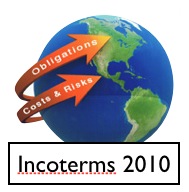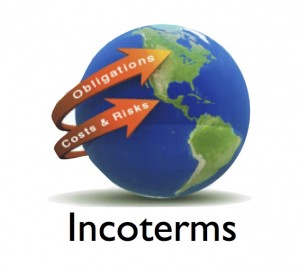International Commercial Terms (Incoterms) are internationally recognised standard trade terms used in export contracts or international sales contracts.
They are used to make sure the buyer and seller know:
- who is responsible for the cost of transporting the goods, including insurance, taxes and duties.
- where the goods should be picked up from and transported to.
- who is responsible for the goods at each step during transportation
The current set of Incoterms is Incoterms 2010.
A copy of the full terms is available from the International Chamber of Commerce
What do the Incoterms mean?
Incoterms are used in contracts in a 3-letter format followed by the place specified in the contract (eg the port or where the goods are to be picked up).
The export contract or international sales agreement includes the 3 – letter format below usually in the delivery section of the contract.
There are different terms for sea and inland waterways (eg rivers and canals) compared to all other modes of transport.
The common terms cover any mode of transport (air, sea etc) and are explained below.
Each term has different implications for the UK exporter and the Asian importer for the cost of transport and risk if the goods get damaged and the need for insurance to cover these damages
In the examples below the UK exporter is the seller and the buyer is the Asian importer.
EXW (‘Ex Works’) eg EXW London
The seller makes the goods available to be collected at their premises and the buyer is responsible for all other risks, transportation costs, taxes and duties from that point onwards. This term is commonly used when quoting a price. This puts the most obligations on the buyer.
Example
Goods are being picked up by the buyer from the seller’s warehouse in London. The term used in the contract is ‘EXW London”.
FCA (‘Free Carrier’)
The seller gives the goods, cleared for export, to the buyer’s carrier at a specified place. The seller is responsible for getting them to the specified place of delivery. This term is commonly used for containers travelling by more than one mode of transport. E.g. the UK exporter delivers the container by road to the rail distribution centre at London Gateway and the Asian importer is responsible from that point to transport the container to Asia.
CPT (‘Carriage Paid To’)
The seller pays to transport the goods to the specified destination. Responsibility for the goods transfers to the buyer when the seller passes them to the first carrier. E.g. UK exporter ships the goods from London Gateway to Singapore. Asian importer connects goods from Singapore port and distributes them to the Kuala Lumpur distribution centre in Malaysia. Asian importer insures the goods during shipping.
CIP (‘Carriage and Insurance Paid’)
The seller pays for insurance as well as transport to the specified destination. Responsibility for the goods transfers to the buyer when the seller passes them to the first carrier.
CIP (‘Carriage and Insurance Paid’) is commonly used for goods being transported by container by more than one mode of transport. If transporting only by sea, CIF is often used (see below).
DAT (‘Delivered at Terminal’)
The seller pays for transport to a specified terminal at the agreed destination. The buyer is responsible for the cost of importing the goods. The buyer takes responsibility until the goods are unloaded at the terminal.
DAP (‘Delivered at Place’)
The seller pays for transport to the specified destination, but the buyer pays the cost of importing the goods. The seller takes responsibility for the goods until they are ready to be unloaded by the buyer.
DDP (‘Delivered Duty Paid’)
The seller is responsible for delivering the goods to the named destination in the buyer’s country, including all costs involved.
This is the most onerous requirement for the UK exporter and the UK exporter will need to know all costs when it quotes to the Asian importer on the DDP basis.
If the UK exporter is uncertain which of the Incoterms to choose or if any of the relevant Incoterms does not correctly describe what has been agreed with the Asian importer, then the detail for delivery including who pays for transport, insurance and any export and/or import licences should be written into the export contract.
For more information please contact Richard Mullett on 0208 334 8049.
For more information about exporting, check The UK Government’s Department for International Trade resources for exporters, Exporting is Great, E-Exporting Programme and Open to Export.
The Legal Partners are a Member of the Trade Advisory Network







